Navalny’s Death Overshadowed Moscow’s Disinformation on the Military Campaign in Ukraine
Most recently, such disinformation was directly spread by Putin when he was interviewed by American reporter Tucker Carlson. However, that disinformation campaign was soon overshadowed by the death of Putin’s most prominent political opponent, Russian lawyer Alexei Navalny. His death in a remote Siberian prison was shrouded in unresolved and mysterious circumstances
‘Alexei Navalny. Photo: Alexey Yushenkov/Алексей Юшенков, CC BY-SA 3.0 Wikimedia
Despite this February marking the two-year anniversary since the start of Ukraine’s suffering at the hands of Russian aggression, which has resulted in thousands of casualties and a never-ending destruction of everything significant for Ukraine and Ukrainians, Moscow’s disinformation campaign in regard to its military campaign continues to persistently spread throughout the world. Most recently, such disinformation was directly spread by Putin when he was interviewed by American reporter Tucker Carlson. However, that disinformation campaign was soon overshadowed by the death of Putin’s most prominent political opponent, Russian lawyer Alexei Navalny. His death in a remote Siberian prison was shrouded in unresolved and mysterious circumstances
The second anniversary of Russia’s invasion of Ukraine, which began on 24 February 2022, was commemorated by paying tribute to those who died fighting for Ukrainian liberty. According to Ukrainian President Volodymyr Zelenskyy, the total number of military casualties is more than 31,000. This number represents the first official casualty figure presented by Ukraine. Thus far, Western and Russian sources speculated that this figure was as high as 200,000.
Among those from the West who paid tribute to Ukraine’s fallen soldiers were Italian Prime Minister Giorgia Meloni, the President of the European Commission Ursula von der Leyen, and Canadian Prime Minister Justin Trudeau. Almost all other countries in support of Ukraine sent their high officials, including North Macedonia, which was represented by the President of the Parliament Jovan Mitrevski.
You, the Ukrainians, showed the world your courage and that the fight for liberty is important…you who fight for the security of our entire continent. This is why you have the entire European Union behind you. More than ever, we stand firmly by Ukraine, financially, economically, militarily, and most of all morally, until your country is finally free, stressed von der Leyen in the joint press conference with Belgian Prime Minister Alexander De Croo, Italian Prime Minister Meloni, Canadian Prime Minister Trudeau, and Ukrainian President Volodymyr Zelenskyy.
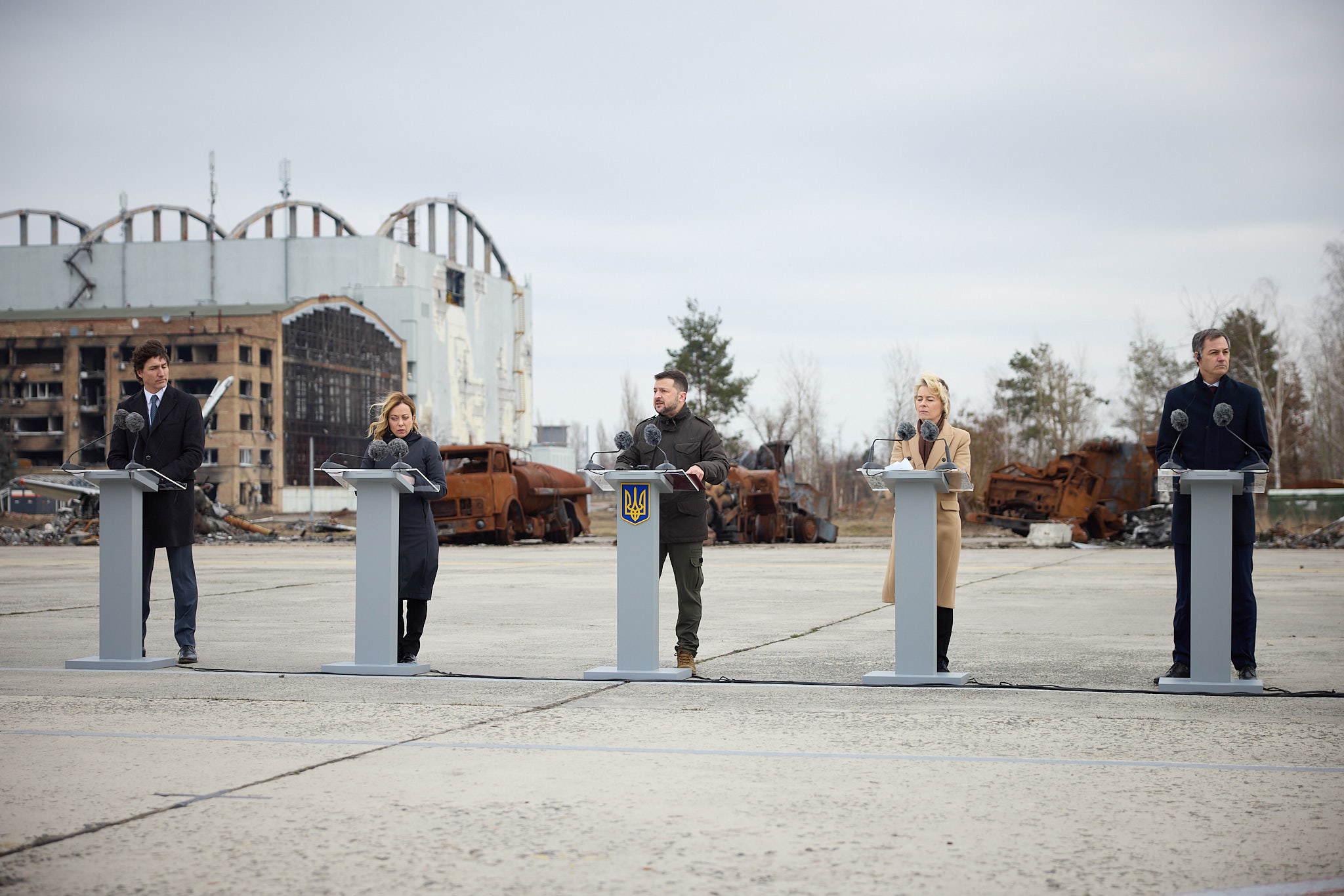
As Macedonian-language media reported, the meeting emphasized the unity of the efforts of the EU and the other democratic countries to support Ukraine “as much as necessary” until the country is finally liberated. Despite such claims, there is a divide regarding when liberation will be achieved and at what cost. As a result, some media outlets comment that peace should not be expected in 2024, mostly due to upcoming EU and US elections. In terms of what is happening on the front, some media have reported on Zelenskyy’s statement that the American Congress should decide within one month on the amount of financial aid it will offer to Ukraine for the country to sustain its efforts in confronting Russia. Immediately after the second-anniversary commemoration, some media outlets reported on statements by certain Ukrainian officials, such as Minister of Defense Rustem Umerov’s statement that the weapons arriving the West were not being delivered on time. Similarly, media outlets reported on Ukrainian Prime Minister Denis Shmyhal’s statement in which he stated that he expects around 12 billion dollars of US financial support to overcome the country’s 37 billion dollar deficit as a result of the war with Russia. Although generally careful and attentive, Macedonian-language media, especially online outlets, have shared news from Russian media, such as Russia Today. One such article claimed that after their meeting in Kyiv, Zelenskyy asked of Italy’s Prime Minister Meloni to revoke the visas of citizens who supported Vladimir Putin, which would be quite an illogical request.
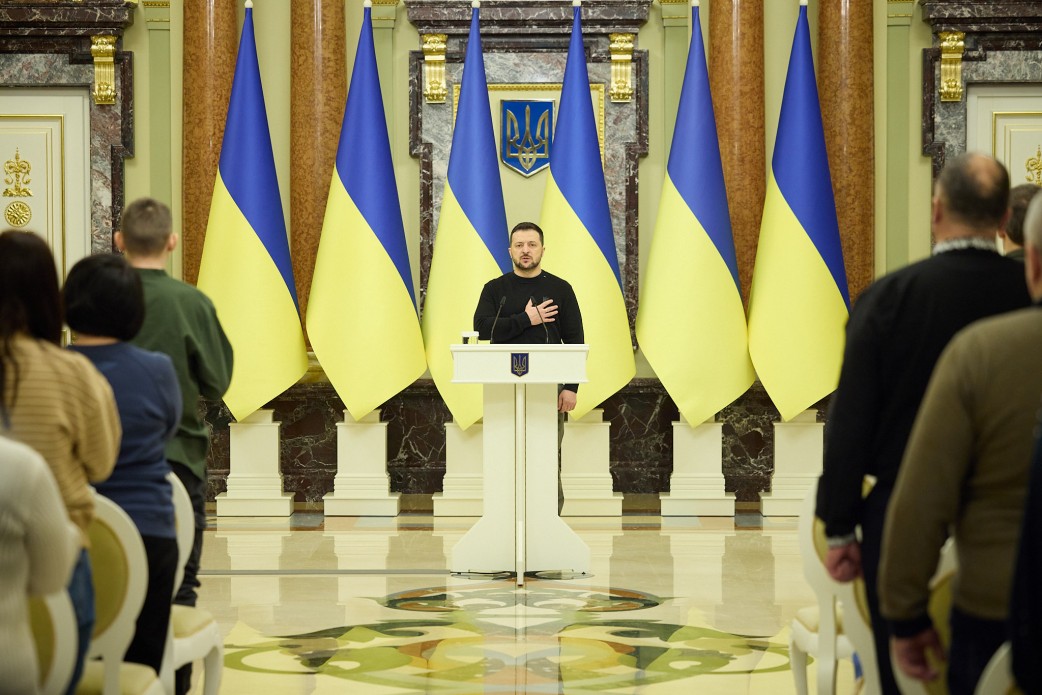
The latest series of appeals for expedited assistance in Ukraine resulted in French President Emmanuel Macron’s statement on the possibility of some European countries sending their own troops in Ukraine. Several European prime ministers responded sternly to Macron’s statement, stressing that they do not plan on any such action. NATO, through its Secretary General Jens Stoltenberg, announced that the Alliance did not have such plans and the White House also denied that it would ever send troops to Ukraine. These statements were then used by Moscow to form a new disinformation narrative. Firstly, Putin’s press secretary Dimitry Peskov stated that sending troops of any kind would constitute a pretext for Russia to go to war with NATO, which feeds into the disinformation narrative intended to fearmonger about a third world war and the use of nuclear weapons). The following day, the spokesperson of the Russian Ministry of Foreign Affairs, Maria Zakharova, stated that such a negative response to Macron’s statement by many European and global leaders, simply meant that the West has betrayed Ukraine, which is related to the disinformation narrative that the West will fight in Ukraine until the last standing Ukrainian and that Ukraine is a pawn to the West.
The disinformation narrative regarding nuclear war was eventually reiterated by Vladimir Putin in his annual address of the nation:
They are preparing to attack our territory by using their best and most effective forces. However, we remember the destiny of those who tried to invade our territory and, indeed, their fate will be much more tragic compared to all that we might face. They do not understand that we also have arms – weapons with which we can win on their territory… stated Putin, as reported by Macedonian language media.
Navalny became a legend and martyr in spite of all of Moscow’s efforts
The death of Alexei Navalny in a high-security Russian prison, though still unresolved (even Ukrainian secret services claim that it was caused by a blood clot), turned him into a martyr and mobilized many Russian citizens, despite Moscow’s determination to achieve the opposite – all of which served to create a new wave of Russian attacks on all remarks made by the democratic world which insisted on accountability.
Navalny died on 16 February and Russian officials immediately started claiming that the West and Navalny’s family would exploit his death and blame Moscow for it, further suggesting that the West had already reached its conclusion regarding his death. Some Macedonian-language media outlets immediately started to report on the differences in the interpretations of the cause of Navalny’s death.
In the following two days, thousands of citizens protested in around 20 Russian cities, which resulted in Russian authorities arresting at least 400 people. Later, it was reported that before releasing those arrested (or as they were being released), Russian authorities had handed them draft notices for the Russian Army.
Shortly after his death, Alexei’s wife, Yulia Navalny, made accusations in which she claimed that her spouse was poisoned again with the poison Novichok, although the reason for death, as of now, remains the same as what the Russian authorities claim – a cardiovascular problem. She announced that he will take over her late husband’s role in leading the Russian opposition against Putin. After that she took part in a series of talks with the EU and US President Joe Biden, which were then followed by a new series of sanctions by the EU and US against Russia.
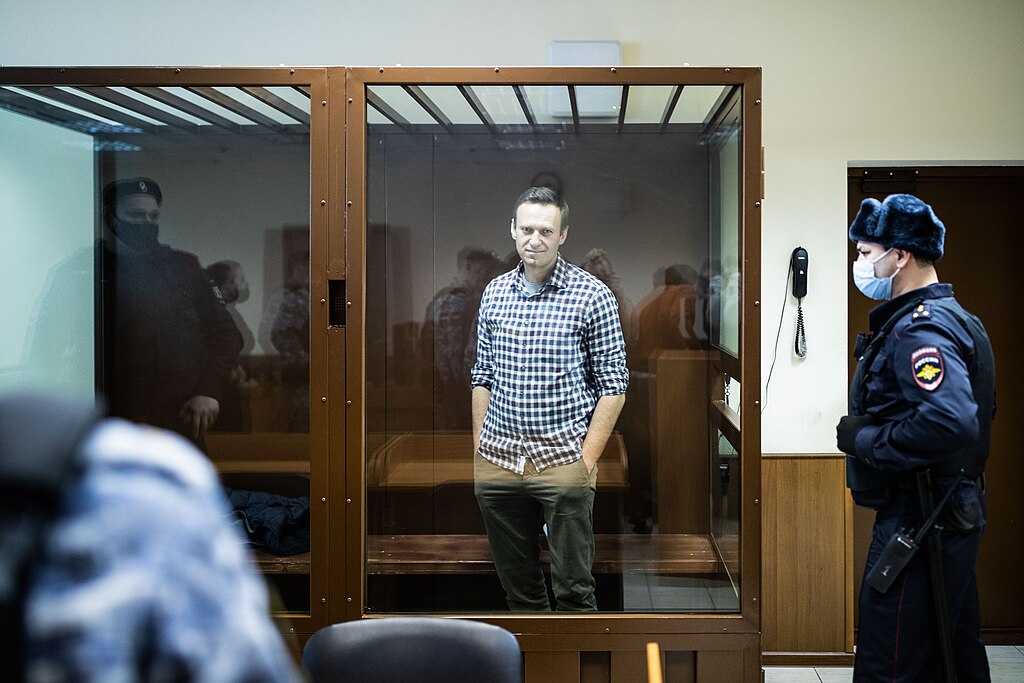
Russian authorities kept Navalny’s body for nine days without handing it over to his mother who claimed that she was blackmailed over the way the burial should be handled. On 25 February, Navalny’s body was given to his family, but the funeral was delayed because his family could not find a funeral home willing to take over the job. The funeral was scheduled for Friday, 1 March, but there has been no confirmation as to whether a ceremony will take place. In the meantime, lots of speculations about the cause of Navalny’s death were circulating (including a single deadly punch to the heart), in addition to commenting on his fate. The promotion of one of the top managers of the penitentiary was a plain mockery of all suspicions and high-level provocation, made by President Putin himself. A few days after that, the chief investigator of Navalny’s court case was also promoted.
However, the most interesting theory regarding Navalny’s death was the one published in an article from the German newspaper Bild. It claimed that Navalny was supposed to be exchanged for a Russian intelligence officer serving a sentence in Germany, with the US being involved in the negotiations.
According to Bild, Russian President Vladimir Putin wanted to exchange the politician for Vadim Krasikov, a Russian in a German prison sentenced for the murder of the former Chechen commander Zelimkhan Khangoshvili in Berlin. Previously, Bild wrote that a connection could be made between the recent arrest of a German citizen on Pulkovo Airport in St. Petersburg and Russia’s intent to exchange Navalny for Krasikov, reported Macedonian-language media.
Two weeks after that, towards the end of February, these claims were reiterated in a YouTube video titled “Why did Putin kill Navalny now?” A close collaborator of the oppositional politician Maria Pevchikh said that after several months of lobbying for a prisoner exchange for Navalny, “our plan was approved”, as some Macedonian-language media reported, citing Politico. Other Western media also confirmed this information later.
Tucker Carlson – Putin’s megaphone
The largest quantity of Russian disinformation narratives circulating in North Macedonia through Macedonian-language media outlets at the beginning of February was related to news articles about American reporter Tucker Carlson’s interview with Russian President Vladimir Putin. This interview was released on 8 February on X (formerly Twitter). Only 14 hours after its release on the platform, it was watched by over 100 million people, while gathering 5 million views on Carlson’s YouTube channel, as some Macedonian language media reported.
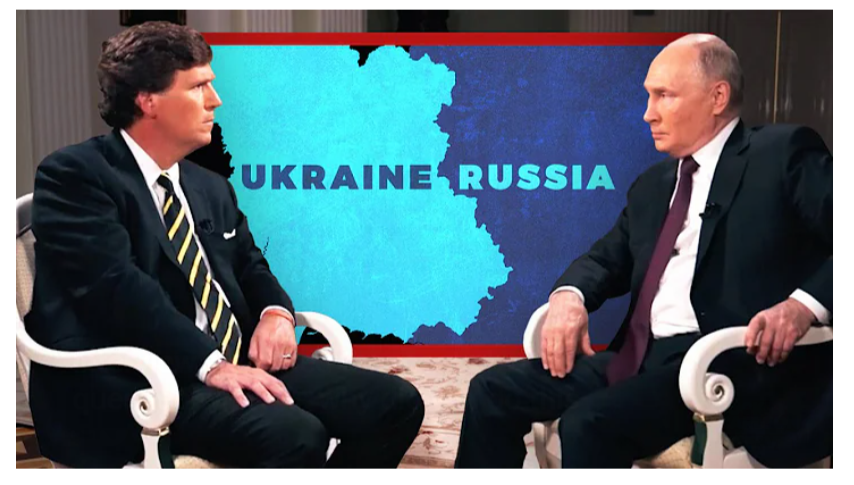
Putin’s interview with Tucker Carlson was the main news when it was released, and a detailed look shows that traditional Russian disinformation narratives were present throughout the entire interview, starting with the idea that Ukrainians and Russians were one and the same people, but were then forcefully separated and that people in the region still felt like a part of one nation to this day the current events have elements of a “civil war.”
Then, Putin focused on the beginning of the war, claiming that it was initiated by the Ukrainians, not Russians, by means of a coup d’etat when they failed to recognize the results of the presidential election.
We did not start this war in 2022. This is an attempt to stop it, said the Russian President.
The West thinks that the fighting in Ukraine has split a part of the Russian people from another part forever, but reunification will come, said Putin.
When accused of violating international conventions and law, Putin brought up the bombing of Yugoslavia in 1999, as reported by some media.
As soon as the developments in Yugoslavia started, Boris Yeltsin raised his voice in support of the Serbs. And we could not help but make our voice heard in defense of Serbs as they are also close to us as an Orthodox nation. It is a nation that has suffered so much for generations, said Putin. Regarding NATO’s bombing, he added:
It was the US that let the genie out of the bottle. What did they say when Russia protested and expressed its resentment? That UN Charter and international law had become obsolete. Now everyone evokes international law, but back then they said it was outdated.
Carlson asked Putin whether NATO was worried that the war could turn into a global war or nuclear conflict.
At least that is what they are talking about, and they are trying to intimidate their own population with an imaginary Russian threat. This is an obvious fact. Realistic people understand that this is all a lie. They are trying to create a “Russian threat,” said Putin, as reported by some Macedonian language media.
Carlson opened up the issue of whether the threat he spoke about was the potential Russian invasion of Poland and Latvia and whether a scenario in which Russian troops would be sent to Poland was conceivable.
Only in one case – if Poland attacks Russia. Why? Because we have no interest in Poland, Latvia or anywhere else. Why would we do that? We simply have no interest. It is just inciting threats, responded Putin.
It is against common sense to get involved in some kind of global war. A global war will bring the entire humanity to the brink of destruction. Of course, there are always some means of deterrence, Putin said.
In terms of other disinformation narratives, Putin again focused on the denazification of Ukraine, adding that Russia had not yet achieved the goals of its “special military intervention”.
Reactions to the interview
Some media outlets published Hillary Clinton’s response to the interview, in which she described Carlson as a “useful idiot”. Clinton suggested that Carlson was a laughingstock in Russian media.
If you actually read translations of what’s being said on Russian media, they make fun of him – he’s like a puppy dog, said Clinton. I would not be surprised if he emerges with a contract with a Russian outlet because he is a useful idiot, she added.
Rolling Stone suggested that Putin wiped the floor with Carlson in the Kremlin, as some Macedonian-language media outlets reported. Some media, however, were pro-Putin:
And if you saw Putin, there is not much to add. Compared to his American counterpart, the man is Noam Chomsky, Bismarck, and Michael Jordan.
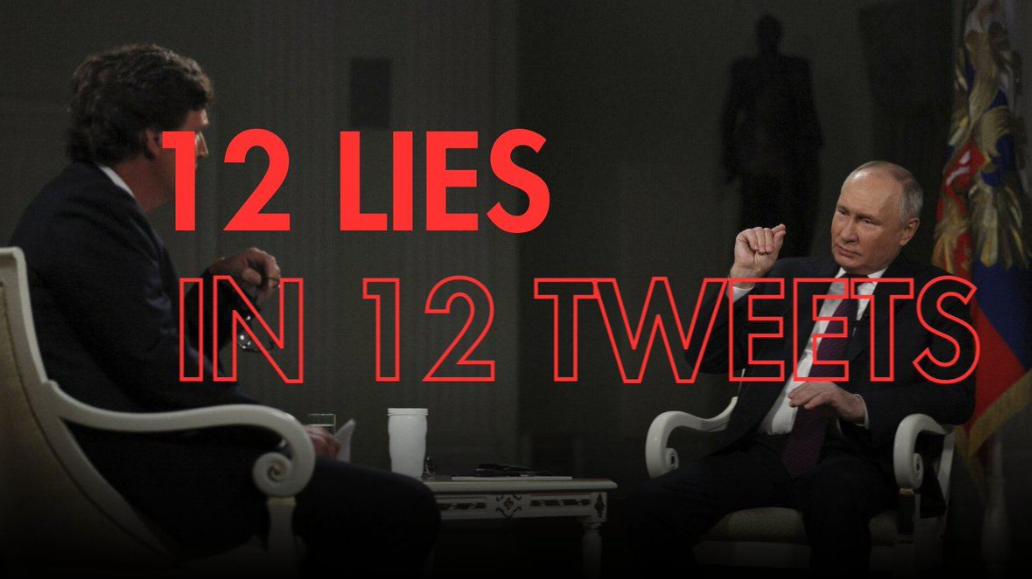
Khodorkovsky exposed Putin’s lies
A few days afterwards, Russian oligarch Mikhail Khodorkovsky exposed the 12 lies uttered by Putin in his interview with Carlson. Some of these lies are rooted in several well-known Russian narratives regarding Ukraine.
For example, regarding NATO’s enlargement, Khordorkovsky says “such an agreement never existed. This was confirmed by Gorbachev, and in any case, the countries which entered NATO did so on their own accord. If Putin did not want NATO to grow, he should not have declared war on his neighbors”. Regarding Putin claiming he never said that NATO was preparing to attack Russia. “He stated this three days prior to the invasion of Ukraine, declaring the country a ‘stronghold’ for a NATO attack”.
Putin does not understand Ukrainian identity
In addition, through Putin’s lies, Khodorkovsky exposed the Russian disinformation narrative about Ukrainians seeing themselves as Russians – an old and oft-repeated narrative.
Putin’s understanding of Ukrainian identity is fundamentally wrong. He falsely believes that Ukrainians see themselves as Russians – the key mistake that brought about the disastrous invasion. A 2022 poll indicated that 93 percent of the Ukrainians support independence and only three percent support the unification with Russia, says Khodorkovsky.
Khodorkovsky also exposed the narrative about Zelenskyy being a neo-Nazi by debunking Putin’s oft-repeated lie that Zelenskyy’s father collaborated with the Nazis and their followers in Ukraine.
Volodymyr Zelenskyy’s father was born in 1947, after the end of the Second World War, says Khodorkovsky (the full original text is available here).
After this news went viral, the media reported Russian TASS’s article containing Dmitry Medvedev’s response on Telegram, who stated that “the cure was effective”, referring to the interview. As published by some Macedonian-language media outlets, Medvedev, one of the biggest propagandists of Russian disinformation narratives, pointed out that it was not common practice for chiefs-of-state to comment on the topic of an interview of their counterparts, TASS reports.
But, in this case, here it is. Two of the greatest politicians of our time, the British oddball Sunak and the pure-blooded German Scholz started expressing disagreement with the contents of the interview of the Russian President with Tucker Carlson. They do not like the interview or its arguments, they did not like anything about it, wrote Medvedev on Telegram, concluding that such a thing indicated that “the cure struck exactly where it needed to.”
Related to this interview, another disinformation narrative started popping up on Facebook. In one of the posts debunked by Truthmeter, a user claimed that The Guardian had published the interview, while other media outlets, especially American ones, had supposedly kept silent about it. Other Russian disinformation identified by Truthmeter included a great number of posts referring to Zelenskyy’s wealth (this time claiming he had purchased two yachts), followed by a narrative claiming that Europe was at war with Russia due to which Macedonian citizens should prepare for mobilization, among other narratives.

All comments and remarks regarding this and other Vistinomer articles, correction and clarification requests as well as suggestions for fact-checking politicians’ statements and political parties’ promises can be submitted by using this form
